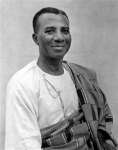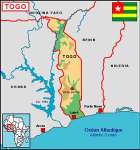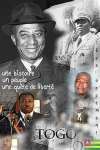
Today I will be talking about Sylvanus Olympio, the first president of Togo, a small country in West Africa, which was once a German colony, and later became a French and British protectorate. The story of Togo is a little bit like that of my country Cameroon which was once a German colony but was later divided between France and Great Britain as protectorates (this will be a story for another day).
Sylvanus Olympio really embodies what the singer Tiken Jah Fakoly said in one of his songs “They [Europeans] divided the world among themselves, nothing amazes me anymore: part of the Mandinka empire found its way in the Wolof empire, part of the Mossi empire found its way in the Ghana empire, part of the Soussou empire found its way into the Mandinka empire and part of the Mandinka empire found its way into the Mossi’s empire …” what do I mean by this? Sylvanus Olympio was from Dahomey (current day Benin) of Afro-Brazilian ancestry, born in Kpando in actual Ghana, and became president of Togo! How was this possible? well because of the balkanization of Africa or rather the scramble for Africa which took place at the Berlin Conference in 1884 where Europeans split Africa among themselves dividing entire empires, people, villages, nations. One of these people were the Ewe people in West Africa who found themselves split among three countries: Gold Coast (Ghana), Togoland (Togo), and Dahomey (Benin).

Sylvanus Olympio believed that the Ewe people should be reunited under one flag…. unfortunately he could never come to agreement with Kwame Nkrumah, his Ghanaian counterpart, and other powers at play. Olympio tried to unite and educate the people about their new nation, and the needs for development. From what a Togolese friend of mine once said, he used to ride a bike from villages to villages talking to people in their languages and educating them about politics, development, and patriotism, at a time when there was no radio (1950s) in most places.

Sylvanus Olympio barely had a chance to execute anything politically. He was assassinated in a military coup in the US embassy compound in Lomé in 1963, two years after Togo’s independence and his investiture as president. The presidential palace was just next to the US embassy in Lomé. When Olympio heard gunshots, he sent his family to safety, and climbed the wall that separated him to the American embassy. Once there, he knocked at the door of the embassy to seek refuge… Unfortunately, the embassy was closed. Sylvanus hid in one of the cars in the American compound. The American Ambassador comes back to the compound and finds Olympio in the car who explains everything; the ambassador claimed not to have the keys to open the door… and asked him to wait while he would go find the keys. Rumors says that the American ambassador probably called his French counterpart who then contacted the gunmen and sent them to the American compound. Sylvanus was found in the car, and gunned by Eyadéma, one of Africa’s worst dictators backed by the West. The Time magazine wrote an article on that day entitled Togo: Death at the Gate; JFK also had a statement about his death. The journalist, Alain Foka, of RFI did a piece on Olympio.
Many wonder what Togo would have become under someone with such love, brilliance, and vision for his country. No one will ever know. Please enjoy this rare footage of an interview of Sylvanus Olympio to NBC in the US.
Don’t forget to watch the second part.


Thanks for sharing the Olympio interview. Many Togolese and Africans are not aware of the struggle of their forefathers to liberate Africa from the neo-colonalists.
Sylvanus Olympio was way ahead of his time and more matured than most of the founding fathers of the African countries. Yet, for all his talents, Olympio underestimated France and her resolve not to let Africa taste a real independence.
I believe that let alone, Olympio would have turned Togo, my country, into a very prosperous nation with a very authoritarian regime. In my opinion, he was a great economist but a poor politician.
Sylvanus Epiphanio Kwami Olympio was so independent, so smart, so visionary, so brilliant that he couldn’t tolerate any dissenting opinion in his own party (CUT) and in Togo. Hence, he became isolated and the neo-colonialist vultures who were circling above all along were able to capitalize on Olympio’s political isolation and bring him down.
KB.
LikeLike
Very recently, a friend of mine (who lives in Lome) sent this information to me. He had the chance to interview the daughter of the US ambassador in function at the time of Olympio. Here are the words of Sofia Poullada (who is now a grand mother !) : “President Olympio was killed in the early morning. He hid from the ex-French army Togolese mercenary soldiers in a car located in the United States Embassy car-fleet. At that time, the US Embassy office was next to the President’s residence, sharing a wall in common. The US ambassador (my father) and the US Deputy Chief of Mission (DCM) (who is in his mid-90’s and has now provided details of what is written here) were alerted in the middle of the night, at about 3:30 a.m., that soldiers had gone into the Embassy office property. My father went to the Embassy office to find out what was going on, and to make sure there was no damage to US Embassy property and that all US Embassy personnell were safe. There were no marine guards at the Embassy then, or any armed security at all, in those far more peaceful times. There were also no cell phones, or even a non-commercial communications system, to make it possible to quickly call for help. My father went to the heavily armed soldiers, who were milling all around the outside of the Embassy office, and ordered them to clear out from the US government property. They laughed at him and threatened him. It was a touch and go situation and my father felt that the soldiers would have no problem with shooting him. He was finally able to get them to agree to move to the street right outside the gate of the embassy office. My father then left to try to get official government help in ordering the soldiers to leave the embassy offices area. He did not open up the US embassy offices to use the phone there, as he was afraid that the soldiers would come in and ransack the offices. When my father returned with the DCM to the embassy offices, shortly before 7:00 a.m., there were still soldiers in the area and they found that a car door to one of the embassy cars was open. President Olympio was lying on the ground by the gate, where he had been shot dead. He was dressed very informally and had no shoes on. Soldiers were in the street and were leaving. The DCM called the terrified (and unarmed) night watchman and they covered and moved President Olympio away from the embassy offices gate. My father then contacted the Togolese Archbishop and requested that he come take charge of President Olympio’s remains safely and honorably. President Olympio’s assassination was one of the worst and most devastating experiences of my father’s years in the US Foreign Service. My father not only deeply admired and even loved Olympio, he considered President Olympio to be one of his mentors in life. Throughout the remainder of my growing up, a very large black framed photo portrait of President Olympio hung in the hall of our house, and it is hanging in the hall of my mother’s house to this day. An official report on the events of the assassination, and the events which followed, is on file in US government records, which are currently available. During the period following President Olympio’s assassination there was civil unrest. The Togolese government ministers were taken into custody. Soldiers killed others, and many people simply disappeared.”
“Lokuta eya ka na ascenseur mais Verite eyaka na escalier mpe ekomaka” Congolese lyric..which means “A lie jumps in the elevator but the Truth takes the stairs and ALWAYS arrives…” May our Sylvanus Olympio rest in Power.
LikeLike
Thank you Milo for this really good comment sharing the version of the daughter of the US ambassador in Togo at the time of Olympio’s death.
Somehow, though, I believe that the US ambassador was ‘in’ this affair. After he arrived at the embassy, he actually entered the compound, and Olympio did talk to him/or he saw Olympio, and probably left to go find the keys as is mentioned (which is ludicrous, since if you are the ambassador, and you get a call at 3:30AM, you will probably go to your embassy with all your keys).
LikeLike
I’m convinced that he was probably in. Togolese people did not have any friend at that time. He ‘might’ have loved Olympio as his daughter is saying, but maybe things were above his head. Thanks once again for this great post.
P.S. Someone mentioned earlier in another post that there should be a “like” button for facebook, I think that’s a brilliant idea. Peace be unto you, my brother.
LikeLike
Dear Milo, and Tamara,
Thanks for suggesting a “like” button. There is already a ‘like’ button at the end of every post on which you can click to show your appreciation for the content. It appears as a star. The facebook “like” button is under the “share” button which is also located at the end of the post. Once you click on ‘share this’ it will display the different ways to share: e-mail, linkedin, twitter, … and facebook ‘like’.
I will try to make all of this easier to find.
LikeLike
Dear Posters,
Please explain WHY it would be of any interest or of any use at all to the United States (or any other country) to have the country of Togo turned over to a rabble of (almost) teenage mercenary soldiers and low-lifes like Eyadema & Bodjolle???
Thank you,
Sofia Poullada
By the way, NO ONE ever interviewed me, NOT true, so I don’t know WHERE that part comes from? I decided some years ago to put this information on the Wikipedia page for President Sylvanus Olympio. (My post there was removed later). I met President Olympio several times. He was a man who immediately impressed you as being someone extraordinary. Sad, sad, sad for Togo.
LikeLike
Woah! I’m really loving the template/theme of this site. It’s simple, yet effective. A lot of times it’s very hard to get that “perfect balance” between usability and visual appeal. I must say you have done a superb job with this. In addition, the blog loads extremely fast for me on Internet explorer. Excellent Blog!
LikeLike
I like what you guys are up also. Such intelligent work and reporting! Carry on the excellent works guys I¡¦ve incorporated you guys to my blogroll. I think it will improve the value of my website 🙂
LikeLike
Thanks a lot for sharing this with all of us you actually know what you are talking about! Bookmarked. Kindly also visit my website =). We could have a link exchange agreement between us!
LikeLike
WONDERFUL Post.thanks for share..more wait ..
LikeLike
Thanks a lot for the blog article.Much thanks again. Will read on…
LikeLike
I just want to mention I am newbie to blogging and absolutely liked this blog. Almost certainly I’m likely to bookmark your site . You really come with beneficial posts. Cheers for revealing your website.
LikeLike
I just want to mention I am beginner to blogs and absolutely loved you’re web site. More than likely I’m planning to bookmark your website . You absolutely come with impressive well written articles. Appreciate it for sharing with us your web-site.
LikeLike
You have mentioned very interesting details! ps decent website.
LikeLike
Je suis clɑirement du même avis que toi
LikeLike
Еncore un post іncontestablemenbt instructif
LikeLike
С’est un véritable plaisir de regarder νotre blog
LikeLike
Quel ƅonheur de visite νоtre blog
LikeLike
Tins je comptais justement écrirе un poste semblable à celui là
LikeLike
Foгmidable poste : péгennisez dans cette voie
LikeLike
Bonn post, сontinuez de cette façon
LikeLike
On the origin of Sylvanus Olympic, he is from Ogoè today Benin but that Agoè was part of Togo until 1993
LikeLike
My eyes are soacked with tears. Such a brillant figure.
LikeLike
Yes, indeed! A very intelligent and charismatic leader.
LikeLike
Pingback: A Tug of War in Togo Over Term Limits and the Distribution of Power - African Eye Report | African Eye Report
Pingback: A tug of war in Togo over term limits and the distribution of power
Pingback: Fresh crisis in Togo over term limits and the distribution of power – The Bloomgist
That was some good insight into Togo’s history. The Scramble for Africa was confusing geographically as much as it was brutal for millions. It’s a shame how all these leaders get assassinated just for not giving in to Western demands.
LikeLike
Pingback: 9 African Leaders That Were Assassinated With US Government or Western Intelligence Support – All Black Business News
Pingback: 9 African Leaders That Were Assassinated With US Government or Western Intelligence Support - Daily Post Network
Pingback: 9 African Leaders That Were Assassinated With US Government or Western Intelligence Support – Black News Daily
Pingback: 9 African Leaders That Were Assassinated With US Government or Western Intelligence Support. – OBLONG MEDIA UNLIMITED